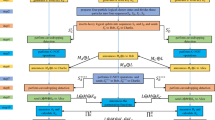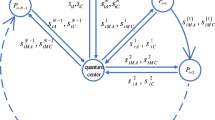Abstract
Collusion attack is a complex cryptanalysis method that can effectively attack quantum key agreement protocol, where some dishonest participants can conspire to steal the final key or the private key of other participants during the implementation of the protocol. Based on the analysis of the four-particle cluster quantum entangled state, a novel multiparty quantum key agreement protocol is proposed to address the above issues, which can effectively resist collusion attacks. By utilizing a novel particle transfer structure, namely the bidirectional travel structure, the protocol achieves secure key negotiation with the help of a semi-honest third party by using additional particles. In the key negotiation process, all participants’ contributions to the key are equal. During the protocol execution process, each participant only needs to perform simple unitary operations, single particle measurements, and Bell state measurements, making the protocol more practical. Analysis shows that this protocol has the characteristics of simple operation and security.


Similar content being viewed by others
Data Availability
Data and materials will be made available on request.
References
Cryptography, B.C.B.G.Q.: Public key distribution and coin tossing. In: Proceedings of IEEE International Conference on Computers, Systems and Signal Processing, Bangalore, India, pp. 175–179 (1984)
Allati, A.E., Baz, M.E., Hassouni, Y.: Quantum key distribution via tripartite coherent states. Quantum Inf. Process. 10, 589–602 (2011)
Xu, F., Ma, X., Zhang, Q., Lo, H.-K., Pan, J.-W.: Secure quantum key distribution with realistic devices. Rev. Mod. Phys. 92(2), 025002 (2020)
Mehic, M., Niemiec, M., Rass, S., Ma, J., Peev, M., Aguado, A., Martin, V., Schauer, S., Poppe, A., Pacher, C., et al.: Quantum key distribution: a networking perspective. ACM Comput. Surv. (CSUR) 53(5), 1–41 (2020)
Cabello, A.: Quantum key distribution in the holevo limit. Phys. Rev. Lett. 85(26), 5635 (2000)
Zhang, Z.-j, Li, Y., Man, Z.-x: Multiparty quantum secret sharing. Phys. Rev. A 71(4), 044301 (2005)
Tan, X., Jiang, L.: Improved three-party quantum secret sharing based on bell states. Int. J. Theor. Phys. 52(10), 3577–3585 (2013)
Senthoor, K., Sarvepalli, P.K.: Communication efficient quantum secret sharing. Phys. Rev. A 100(5), 052313 (2019)
Sheng, Y.-B., Zhou, L., Long, G.-L.: One-step quantum secure direct communication. Sci. Bull. 67(4), 367–374 (2022)
Tseng, H.-Y., Lin, J., Hwang, T.: New quantum private comparison protocol using epr pairs. Quantum Inf. Process. 11, 373–384 (2012)
Zhang, W.-W., Li, D., Song, T.-T., Li, Y.-B.: Quantum private comparison based on quantum search algorithm. Int. J. Theor. Phys. 52, 1466–1473 (2013)
Tang, G., Duong, D.H., Joux, A., Plantard, T., Qiao, Y., Susilo, W.: Practical post-quantum signature schemes from isomorphism problems of trilinear forms, 582–612 (2022). Springer
Gao, F., Qin, S.-J., Guo, F.-Z., Wen, Q.-Y.: Cryptanalysis of the arbitrated quantum signature protocols. Phys. Rev. A 84(2), 022344 (2011)
Li, Q., Chan, W.H., Long, D.-Y.: Arbitrated quantum signature scheme using bell states. Phys. Rev. A 79(5), 054307 (2009)
Ikeda, K.: Quantum contracts between schrödinger and a cat. Quantum Inf. Process. 20(9), 313 (2021)
Liu, Z.-F., Yang, R.-J., Cai, X.-Q., Wang, T.-Y.: Multiparty quantum contract signing. Front. Phys. 11, 355 (2023)
Zhou, N., Zeng, G., Xiong, J.: Quantum key agreement protocol. Electron. Lett. 40(18), 1 (2004)
Chong, S.-K., Hwang, T.: Quantum key agreement protocol based on bb84. Opt. Commun. 283(6), 1192–1195 (2010)
Sun, Z., Zhang, C., Wang, B., Li, Q., Long, D.: Improvements on “multiparty quantum key agreement with single particles’’. Quantum Inf. Process. 12, 3411–3420 (2013)
Wang, L., Ma, W.: Quantum key agreement protocols with single photon in both polarization and spatial-mode degrees of freedom. Quantum Inf. Process. 16, 1–15 (2017)
Cai, B.-B., Guo, G.-D., Lin, S.: Multi-party quantum key agreement without entanglement. Int. J. Theor. Phys. 56, 1039–1051 (2017)
Huang, W., Su, Q., Xu, B., Liu, B., Fan, F., Jia, H., Yang, Y.: Improved multiparty quantum key agreement in travelling mode. Sci. China: Phys. Mech. Astron 59, 1–10 (2016)
Yin, X.-R., Ma, W.-P., Liu, W.-Y.: Three-party quantum key agreement with two-photon entanglement. Int. J. Theor. Phys. 52, 3915–3921 (2013)
Cai, B., Guo, G., Lin, S.: Multi-party quantum key agreement with teleportation. Mod. Phys. Lett. B 31(10), 1750102 (2017)
Shi, R.-H., Zhong, H.: Multi-party quantum key agreement with bell states and bell measurements. Quantum Inf. Process. 12, 921–932 (2013)
Shukla, C., Alam, N., Pathak, A.: Protocols of quantum key agreement solely using bell states and bell measurement. Quantum Inf. Process. 13(11), 2391–2405 (2014)
He, Y., Ma, W.: Two robust quantum key agreement protocols based on logical ghz states. Mod. Phys. Lett. B 31(03), 1750015 (2017)
Zeng, G.-J., Chen, K.-H., Chang, Z.-H., Yang, Y.-S., Chou, Y.-H.: Multiparty quantum key agreement based on quantum secret direct communication with ghz states (2016). arXiv:1602.00832
Xu, T.-J., Gan, Z.-G., Ye, T.-Y.: Multiparty semiquantum key agreement with d-level single-particle states. Phys. A: Stat. Mech. Appl., 128991 (2023)
Sun, Z., Yu, J., Wang, P.: Efficient multi-party quantum key agreement by cluster states. Quantum Inf. Process. 15, 373–384 (2016)
He, Y.-F., Ma, W.-P.: Quantum key agreement protocols with four-qubit cluster states. Quantum Inf. Process. 14, 3483–3498 (2015)
Shen, D.-S., Ma, W.-P., Wang, L.-l: Two-party quantum key agreement with four-qubit cluster states. Quantum Inf. Process. 13, 2313–2324 (2014)
Sun, Z., Zhang, C., Wang, P., Yu, J., Zhang, Y., Long, D.: Multi-party quantum key agreement by an entangled six-qubit state. Int. J. Theor. Phys. 55, 1920–1929 (2016)
Liu, H.-N., Liang, X.-Q., Jiang, D.-H., Xu, G.-B., Zheng, W.-M.: Multi-party quantum key agreement with four-qubit cluster states. Quantum Inf. Process. 18, 1–10 (2019)
Cao, H., Ma, W.: Multiparty quantum key agreement based on quantum search algorithm. Sci. Rep. 7(1), 45046 (2017)
Abulkasim, H., Alabdulkreem, E., Hamad, S.: Improved multi-party quantum key agreement with four-qubit cluster states. CMC-Comput. Mater. Contin. 73, 225–232 (2022)
Xu, T.-J., Chen, Y., Geng, M.-J., Ye, T.-Y.: Single-state multi-party semiquantum key agreement protocol based on multi-particle ghz entangled states. Quantum Inf. Process. 21(7), 266 (2022)
Liu, B., Xiao, D., Jia, H.-Y., Liu, R.-Z.: Collusive attacks to “circle-type’’ multi-party quantum key agreement protocols. Quantum Inf. Process. 15, 2113–2124 (2016)
Sun, Z., Cheng, R., Wu, C., Zhang, C.: New fair multiparty quantum key agreement secure against collusive attacks. Sci. Rep. 9(1), 17177 (2019)
Abulkasim, H., Mashatan, A., Ghose, S.: Secure multiparty quantum key agreement against collusive attacks. Sci. Rep. 11(1), 9456 (2021)
Cao, H., Ma, W.: Multi-party traveling-mode quantum key agreement protocols immune to collusive attack. Quantum Inf. Process. 17, 1–14 (2018)
Gao, F., Qin, S.-J., Wen, Q.-Y., Zhu, F.-C.: A simple participant attack on the brádler-dušek protocol. Quantum Inf. Comput. 7(4), 329–334 (2007)
Funding
This research was funded by the major project of natural science research in colleges and universities of Anhui Province(NO.2022AH040235), National Natural Science Foundation of China(NO.62161025) and Anhui University of Science and Technology 2020 Stable Talent Project.
Author information
Authors and Affiliations
Contributions
Conceptualization, Mengqing Yang; Formal analysis, Mengqing Yang; Methodology, Mengqing Yang and Hao Cao; Software, Mengqing; Yang and Hao Cao; Supervision, Hao Cao and Zepeng Zhuo; Writing-original draft, Mengqing Yang; Writing-review and editing, Hao Cao and Zepeng Zhuo. All authors reviewed the manuscript.
Corresponding authors
Ethics declarations
Competing interests
The authors declare no competing interests.
Additional information
Publisher's Note
Springer Nature remains neutral with regard to jurisdictional claims in published maps and institutional affiliations.
Rights and permissions
Springer Nature or its licensor (e.g. a society or other partner) holds exclusive rights to this article under a publishing agreement with the author(s) or other rightsholder(s); author self-archiving of the accepted manuscript version of this article is solely governed by the terms of such publishing agreement and applicable law.
About this article
Cite this article
Yang, M., Cao, H. & Zhuo, Z. Multi-Party Quantum Key Agreement with Four-Qubit Cluster States Immune to Collusive Attack. Int J Theor Phys 63, 50 (2024). https://doi.org/10.1007/s10773-024-05572-4
Received:
Accepted:
Published:
DOI: https://doi.org/10.1007/s10773-024-05572-4




